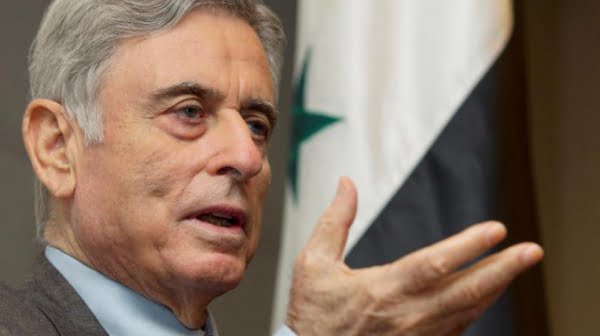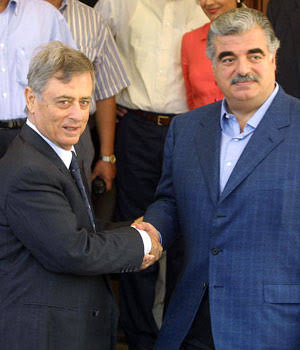On the last day of December in 2014, raindrops fell gently on the car window as it transported me to the residence of Abdul-Halim Khaddam, the former deputy to the Syrian president who defected from the established regime. He chose, on a personal level, to retreat to his Parisian exile without opting for silence or stepping out of the battle arena.
This interview, for me, was an opportunity to document the testimony of one of the most significant figures to leave the Syrian leadership since the outbreak of the revolution. It is a testimony deserving to be a historical record. The judgment of the man, his stage, and his world remain in the hands of contemporaries and truth-seekers.
At half past four, I stood at the threshold of the residence, accompanied by a driver chosen by Mr. Khaddam to escort me, after refusing to provide me with the home address, claiming that his personal driver was more familiar with the location. Perhaps this is the real reason, or maybe this man has things to fear, and he has the right to!
I noticed the presence of official guards in front of his residence – at least two military armored vehicles. The guards at the inner gate were two stern-looking French officers, one of whom scrutinized my face thoroughly before asking for my passport. Quickly, he took a picture of the passport using a device he carried, then allowed me to enter.
One of them led me to a quiet, spacious sitting room. Through its windows, I could see a portion of an elegant backyard, as if it carried some scents of distant Damascus in our strange East!
After a not-so-long wait, he entered the room, which housed elegant artworks. A slender man, he moved with extreme calmness and visible difficulty. He almost spoke to me in a whisper. A man who seems like a voice coming from a distant era, wearing a brown jacket and a matching wool sweater.
A dialogue unfolded between us that lasted for three hours, during which we only paused to drink two glasses of water. I barely touched the black coffee cup he insisted I have, with great gentleness.
We were in this beautiful house, and Khaddam still accuses Bashar al-Assad specifically of planning his assassination, along with his brother Maher, followed by the execution carried out by Hezbollah agents.
The Syrian crisis was at its peak, and Bashar al-Assad and his opponents were still fighting. Much of the Syrian state and its system had been dismantled, and the President still refuses to surrender despite international rejection.
I found Khaddam calm, not seeking any political position, but desiring Syria to return to what it was. This is a difficult matter. It’s easy to enter a war, but the decision to exit is no longer yours.
He told me that the crisis could have been resolved if Bashar had conceded a little, but he chose to burn the country.
I asked him, while the housekeeper placed a cup of coffee in front of me, and he tried to assist her in placing it on the table with a courteous movement:
“What is the future of Syria… Are you for Rifaat al-Assad or the Tlass family?”
He laughed until the fox inside the elderly sheikh awakened, then said with a smile:
“If my grandmother had luck in ruling Syria, it would be for these people…
Rifaat al-Assad is a worthless person.
It was natural for the conversation to delve into comparing the father and the son. Hafez, whom Khaddam had known for many years, and Bashar, who worked with him, and both did not hold proper feelings for each other.
Khaddam calmly states, “Hafez al-Assad was more intelligent and had a greater ability to understand international balances. As for Bashar al-Assad, he is crazy, and he and his brother Bassel have done much harm to their father.”
Speaking about Saudi Arabia, Khaddam told me that he admired King Fahd greatly and still maintains good relations with Saudis. However, he expressed surprise at the Saudi government’s interest in Rifaat al-Assad.
He recounted how he once laughed when he saw Rifaat al-Assad praying the Eid prayer in Mecca next to the king, draped in the cloak of piety. Everyone knew he had no connection to religion or prayer!
There was a lengthy conversation with Mr. Khaddam, and at its conclusion, he gifted me his book “The Syrian-Iranian Alliance.” Personally, I consider this book one of the important documents narrating the story of Syrian-Iranian relations, its transformation from an alliance to subordination, and chapters of the complex relationship between Riyadh and Tehran, shrouded in a long history of mistrust.
Abdul-Halim Khaddam saw in Hafez a statesman and an equal ally with Iran, while Bashar was nothing more than a small follower.
Carrying Khaddam’s book, I headed to my hotel, not far from the Champs-Élysées, the street of light and fragrances, the Champs-Élysées, with New Year celebrations on the horizon. Blocks of light flowed on the ground, and colorful clusters of lights dozed off on the heads of elegant Parisian buildings, creating a joyous movement that never ceased.
On the first night of the new year, curiosity overwhelmed me, and I couldn’t delay reading the book any longer. The Syrian crisis was making headlines, and more importantly, Gulf-Syrian relations were worsening further. The shadow of relations with Iran added a gloomy dimension, with Tehran becoming a party in the conflict rather than a hidden supporter.
Khaddam’s testimony, presented through a book just over four hundred pages, recounts chapters of this Iranian involvement, reinforced by the minutes of the sessions and details of the meetings.
Among the stars of that political stage were President Hafez al-Assad and King Fahd, and it was a horrifying Arab tale about the transformation of that Arab country into a pale Iranian forest. Our conversations were like a eulogy for the Damascene jasmine that went irreversibly.


